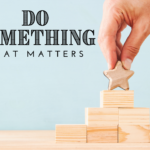I reject the fear that rejection is something to worry about. Let me explain.
Rejection almost never happens. In fact, rejection—at least the kind we all so desperately fear—is extremely rare. To prove this point, I ask my audiences two questions.
“How many of you have been rejected by a person in a way that truly hurt your identity and prospects in life? In a way that significantly impacted your feelings and forever altered your self-worth or potential?” Everyone raises his or her hand to this kind of question.
I keep digging. “How many of you have had at least five people reject you in this significant way?” Fewer people raise their hands. Then I keep going. Seven people? Ten? Fifteen? Twenty?
Think about it: If you and I went to lunch, how many people could you quickly recount who rejected you in such a negative and life-altering way that it forever shaped how you thought about yourself or your future? I’m not talking about someone saying no to a sale, a favor, a date or a job. I’m talking about the rejection that wounds the psyche.
I’ve asked audiences in 35 countries this question. The average number I see worldwide? About seven. But let’s say I’m wrong. So double it. Fourteen people rejected you in a way that forever impacted your identity, self-worth and prospects in life.
Now let’s talk about the second question I ask my audiences.
“How many of you have met, known, interacted with, worked with or generally got along well with at least 10 people in your life?” Everyone laughs. Everyone raises his or her hand.
“How many of you have gotten along well with at least 50 people in your life, in such a way they didn’t reject you or at least didn’t hurt or bother you?” Everyone’s hands go in the air. One hundred people? Two hundred? Five hundred?
The average? Most middle-aged adults have hung out with, talked to, known or interacted with thousands of people in their lives. And those people didn’t reject them, harm them or trouble them.
So what?
If you’re an adult and still driving your life based on a fear of rejection—which many do—you have to revisit the math. If more than 1,000 people were nice to you, and fewer than 14 rejected you in a way that really shaped you, maybe it’s time to realize a few things:
- There are much higher odds that people will be OK with you versus reject you. So be yourself.
- One thousand people could storm the 14 oddballs who don’t get you. Let your squad bring you strength.
- No matter the number, ask, Will I let a small few, those statistical anomalies among thousands, dictate the size of my future? The answer should be no.
This article originally appeared in the January 2018 issue of SUCCESS magazine and has been updated. Photo by @albertolopezphoto/Twenty20











